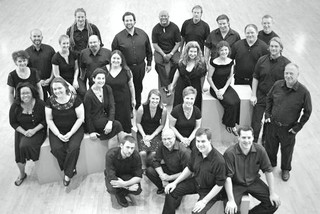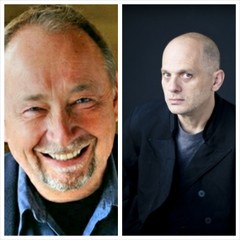|
Back
Music of Madness and Sedition New York
Zankel Hall, Carnegie Hall
02/20/2014 -
Orchestra Underground: Lines on a Point
Ted Hearne: Ripple (New York Premiere)
Lisa Renée Coons: Vera’s Ghosts (World Premiere)
David Lang: statement to the court (New York Premiere)
Amy Beth Kirstein: strange pilgrims (film by Mark deChaizza) (World Premiere)
Steve Reich: Eight Lines
Margaret Kampmeir, Stephen Gosling (Pianos), The Crossing, Donald Nally (Conductor)
American Composers Orchestra, George Manahan (Music Director and Conductor)
Mark DeChaizza (Filmmaker), Mark Andrew (Cinematographer)

The Crossing (© Courtesy of the Artist)
The always innovative American Composers Orchestra added a chamber choir to their ensemble last night. But Philadelphia’s “The Crossing” was not like any choir I’d heard before. Performing almost exclusively contemporary music, with composers like David Lang longing for their assistance, they had not only clarity and stunning beauty, but their sounds were absolutely singular.
In three of the five works last night, each a New York premiere, they created pitch-perfect microtones (yes, an oxymoron, but you get the idea), ranges of vibrato, unvocal sounds harmonizing with glowing solos. Then again, the material they worked with came from four extraordinary composers. Ted Hearne’s work was limited to a single unremarkable report from Iraq which led to a massacre. Amy Beth Kirsten’s strange pilgrims paired chorus and the American Composers Orchestra with an interesting video.
As for David Lang, he took a speech by Eugene W. Debs at his sentencing for sedition, a work as emotional and eloquent and magnificently written as anything by Abraham Lincoln. But because Debs was a socialist (the founder of the International Workers of the World), his words have been practically excised from the annals of great American literature. Mr. Lang, though, is a man of intense passions, and his work, for The Crossing and the American Composers Orchestra was an unalloyed emotional ride.

G. Manahan, D. Lang
(© Richard Bowditch, Ravinia Festival/Peter Serling)
Some of the words echo Thoreau (“while there is a soul in prison, I am not free”), or are a more personal poetic form of our own Declaration of Independence (“Years ago I recognized my kinship with all living beings…”) and they echo the situation of America today: “(Poverty) is not the fault of the Almighty...or nature...but is due entirely to the outgrown social system…that ought to be abolished not only in the interest of the toiling masses but in the higher interest of all humanity.” (Italics mine)
Mr. Lang can be a most complex composer, but here his words were mainly declamatory, as they should have been, each line punctuated with one loud bang on a drum. At times soloists broke away from the chorus, repeating words when necessary. But Mr. Lang in this case knew the gravity of Debs’s words, and he made no attempt to disguise them.
I would suggest that he make a version for every primary school and high school in America, so that they remember the speech the way we remember the Gettysburg Address. But that would be proposing too much.
David Lang’s choral setting was equivalent to Ted Hearne’s Ripple taking a once censored military cable in Iraq, that of an officer who couldn’t identify a car because of “sun coming off the windshield.”
When in doubt, this implies, bomb away. Which he did. Wherein a massacre. Wherein a statistic. And here a choral work of these words, the music sometimes childishly simply, sometimes jarringly dissonant, mostly the two put together.
Behind Ms. Kirsten’s strange pilgrims was a film, and while I am usually dismayed by having both dominant film and music together, here the video was simple enough–looking upwards to waving pine trees, looking downward into the eyes and body of a model–the music was quite attractive.
For sheer open emotion, conductor George Manhan not only led the strings of the American Composers Orchestra, but was the protagonist, in a work by Lisa Renée Coons about the onset of madness. Composers like Penderecki hide their aleatory system, but this composer blatantly had strings take up themes, follow up with instruments (like crowd-waving in a football game) and vary microtones and massive maddening chords. The strings of the American Composers Orchestra are radiant in themselves, so this work, something like Penderecki’s Threnody made its own statement.
Another suggestion, that a composer transform the words of the most intense story about madness, Conrad Aiken’s Silent Snow, Secret Snow.
Finally, one more work which raveled and unraveled itself by Steven Reich. He is a brilliant composer, no doubt about it. And Mr. Manahan’s essentially one-handed conducting, weaving the various metrical changes without swerving, was a joy to watch. But so often with Reich, I feel that I am watching the video of a complex tapestry being taken apart and put together again, or a Professor of Metaphysics taking an almost insoluble system of equations and, with perfect logic, proving they are correct.
Not that Eight Lines was unenjoyable, but–except for composer, conductor and orchestra–it was a comfortable music. We could bask in its repetitions, sit back and mindlessly savor the show.
Harry Rolnick
|